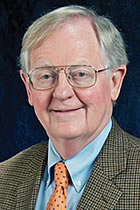BBG Watch Commentary
 Member of our Committee for U.S. International Broadcasting (CUSIB – cusib.org) Advisory Board and former Broadcasting Board of Governors (BBG) member, Ambassador Victor Ashe, has published an op-ed in Knoxville News Sentinel on the 25th anniversary of Poland’s (largely) free elections in 1989.
Member of our Committee for U.S. International Broadcasting (CUSIB – cusib.org) Advisory Board and former Broadcasting Board of Governors (BBG) member, Ambassador Victor Ashe, has published an op-ed in Knoxville News Sentinel on the 25th anniversary of Poland’s (largely) free elections in 1989.
Ambassador Ashe attended an Atlantic Council international conference in Poland, which was also attended by Voice of America (VOA) director David Ensor but not covered by VOA News. Also attending the conference was the President of Estonia, Toomas Ilives. From 1984 to 1993, Ilves worked in Munich, Germany as a journalist for Radio Free Europe, being the head of its Estonian desk since 1988.
The original article by Ambassador Ashe can be seen HERE. (Subscription may be required.)
Ambassador Ashe has made this version of his article available for the CUSIB website. BBG Watch is reposting his op-ed.
Victor Ashe: America’s duty is to provide real help to embattled Ukraine
President Obama visited Poland June 3 and 4 as part of the commemoration of the 25th anniversary of Poland’s free elections in 1989 which led to a freely chosen democratic government in Poland and the fall of Communism. Poland since then has joined NATO and the EU and enjoyed an economic growth which others envy.
Immediately after the Obama visit, the 5th annual Wroclaw Global Forum was held in southwestern Poland sponsored by the US based Atlantic Council. I attended the conference. This three day meeting brings together governmental, academic, commercial and civic leaders from Central and Eastern Europe and from the United States.
Participating were the President of Estonia, Toomas Ilives; Senators John McCain (R-AZ), Ron Johnson (R-WI) and Chris Murphy (D-CT); along with the Polish Foreign Minister Radek Sikorski, a former Prime Minister of Hungary and four current and former US Ambassadors to Poland.
It was ironic that while Poland was celebrating its transition to democratization and economic freedom, Russia is concurrently waging war to prevent the same process from moving forward in Poland’s immediate eastern neighbor, Ukraine.
The Russian acquisition of Crimea dominated the entire conference as well as virtually any conversations that were held with Poles outside the meeting. The uncertainty of the final outcome and the realization that this story continues to evolve worries Poles. While President Obama’s words were well crafted and delivered, the concern is whether there will be a strong follow up? Will Congress approve the $1 billion appropriation which Obama said he would seek.
On the negative side, Vladimir Putin continues his covert and overt efforts to destabilize Ukraine thru insurgencies in the East. Over 300 people have died. The Ukrainian economy is a basket case and Europe finds it difficult to speak with one unified voice. France is selling a warship to Russia and limited sanctions imposed by the United States to date have triggered opposition from some businesses in European nations who value Russian trade.
On the positive side, Ukraine has elected a new President without a runoff being required due to the large majority he received. He is Petro Poroshenko who has served in previous Ukrainian governments and its Parliament. The election was fairly and freely held in contrast to Russian elections. Ukraine is more united than ever in the face of Russian aggression. Ukraine knows it must face its own internal corruption issues if its economic health is to be vibrant.
Putin has done the world one favor in reminding us all how fragile freedom can be and how easily it can be thwarted. He has shown the world his true colors going back to his days as a KBG officer. Each move he has made against Ukraine he has voiced previously but the West failed to believe or acknowledge what he was saying.
The three member bipartisan Senate delegation spoke with one voice which was reassuring to the Poles. Connecticut’s Democratic Senator, Chris Murphy, said “If Putin does not pay a price–and I think it is arguable right now, whether the United States and Europe are going to join together to force Putin to pay a price–this might not be the end of his provocations.”
Poland would like to see a NATO or US base established permanently in Central Europe in the view that Russia would not attack US soldiers. There is also the question of whether European governments will meet the threshold of 2% of their annual budgets being dedicated to defense. Germany does not meet this standard. The US does meet it. Poland has pledged to meet it. While the US must continue to be engaged in backing the sovereign integrity of European nations, those same nations must bear some of the financial cost for their own defense.
The US should provide real practical assistance to the Ukrainian military in terms of arms and hardware for them to defend themselves. Putin invariably sees the absence of such help as weakness.
When both Vice President Biden and Senator McCain attended the inauguration of President Poroshenko in Kiev, it sent a strong positive signal that two American political opponents could appear in a bipartisan way. Political opponents coming together in Eastern Europe does not often happen and this example from the US is well noted.
This story continues to be written. It is occurring in a difficult environment. The Administration must advocate strongly its view before Congress which should respond in a forward looking way to promote freedom for people who yearn for it.
Victor Ashe was the 25th US Ambassador to Poland and served from 2004 to 2009. He is a former mayor of Knoxville and former member of the Broadcasting Board of Governors.
